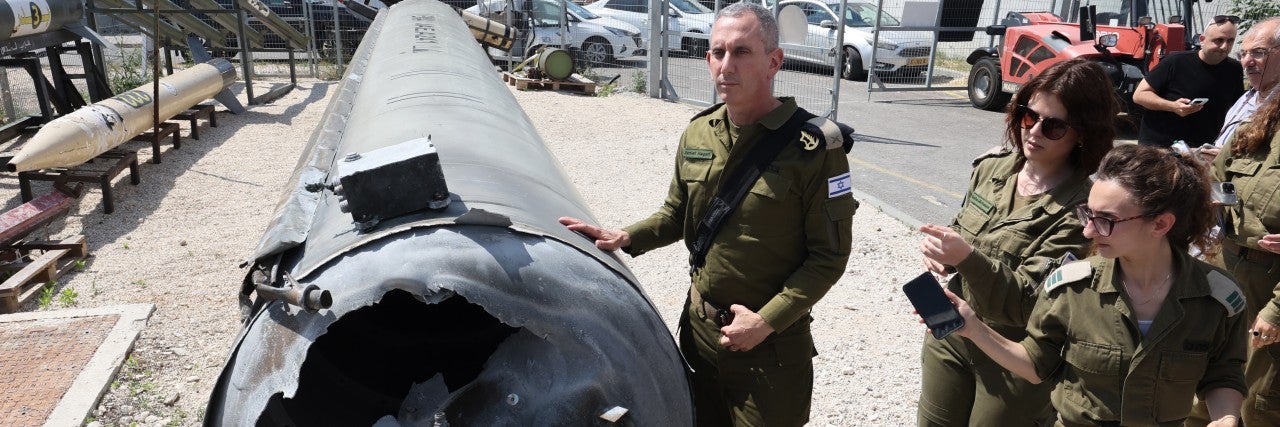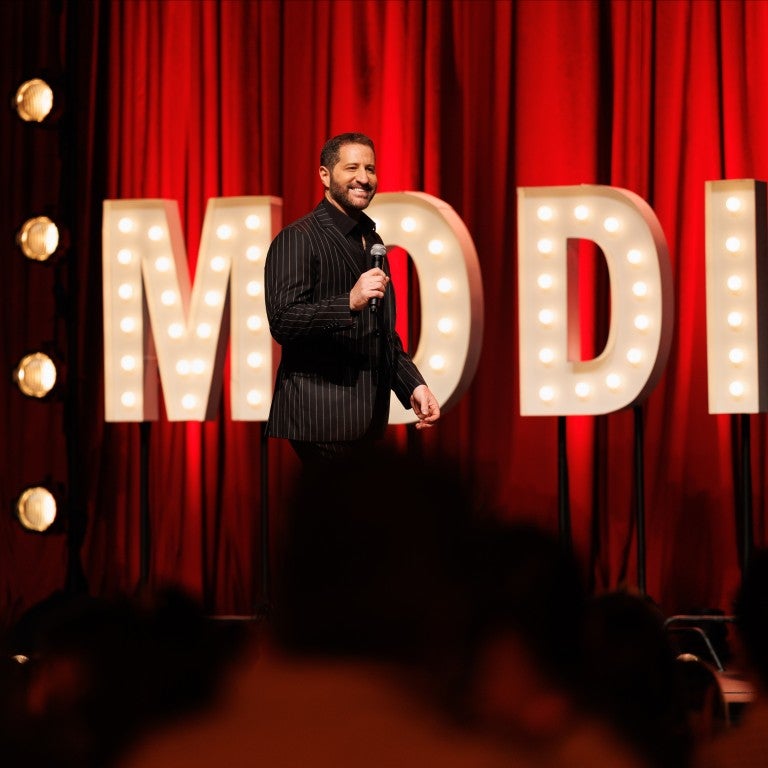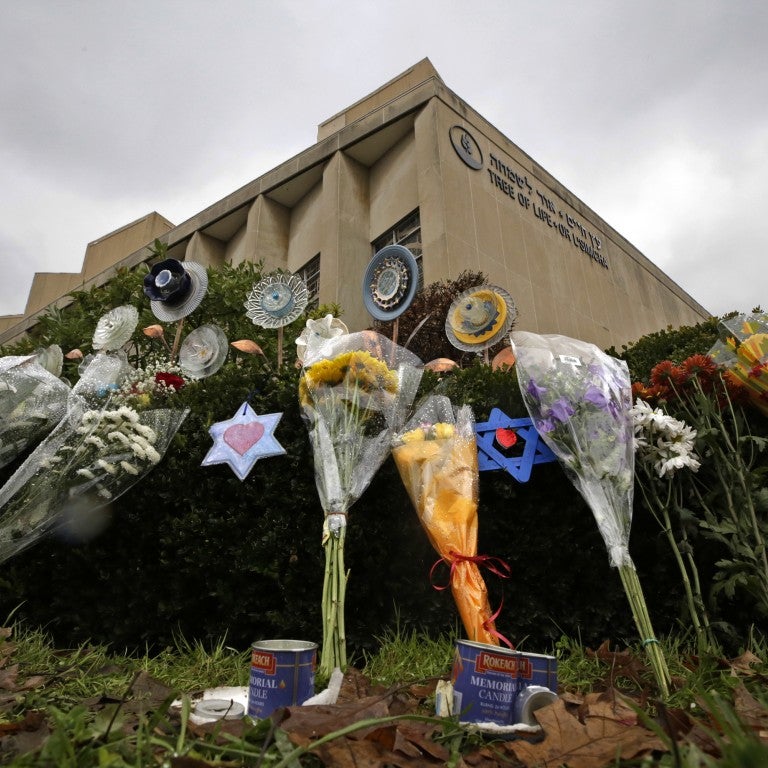April 17, 2024
AJC Jerusalem Director Lt. Col. (res.) Avital Leibovich shares how the IDF — and its neighbors and allies — defended Israel with remarkable success. In the early hours of April 14, sirens and explosions were heard across the Jewish state. In an unprecedented, first-ever direct attack on the Israeli people, the Iranian regime launched a wave of more than 300 drones and missiles.
Episode Lineup:
- (0:40) Avital Leibovich
Show Notes:
Take Action:
Join AJC in urging Congress to call on the EU to designate all of Hezbollah and the IRGC as terror organizations.
Read AJC’s Explainers on Iran:
- Get the Facts About Iran’s Unprecedented Attack on Israel
- ‘Crimes Against Humanity:’ Another UN Report Finds Sexual Violence by IRGC and Other Authorities in Iran; Similar to Crimes by Hamas
- What is Iran’s Islamic Revolutionary Guard Corps and Why is it Designated a Terror Group by the United States?
Listen to AJC’s People of the Pod:
- Meet Modi Rosenfeld – the Comedian Helping the Jewish Community Laugh Again
- A Look Back: AJC’s Award-Winning “Remembering Pittsburgh” Series
- Jewish College Student Leaders Share Their Blueprint for Combating Antisemitism
- Matisyahu’s Message to His Fellow Jews and to the Israel Haters Trying to Cancel Him
Follow People of the Pod on your favorite podcast app, and learn more at AJC.org/PeopleofthePod
You can reach us at: peopleofthepod@ajc.org
If you’ve appreciated this episode, please be sure to tell your friends, and rate and review us on Apple Podcasts.
Episode Transcript:
Manya Brachear Pashman:
Few of us slept well on Saturday night into Sunday knowing that Iran had launched a wave of more than 300 drones and missiles in its first ever direct attack on Israel. In the early hours of Sunday, sirens and explosions were heard across the Jewish state. Here to talk about how Israel definit itself from what many feared was inevitable, Director of AJC Jerusalem Avital Leibovich, who also serves in the Israel Defence Force Reserves.
Avital Leibovich:
Thank you.
Manya Brachear Pashman:
So can you share with our listeners what it was like to hear that Iran had launched this wave of missiles and drones? Did Israelis immediately pack up and head for shelters?
Avital Leibovich:
I think that was one of the most dramatic nights in Israel's history. You know, we're living in an era in which everything is televised and broadcasted. And when those drones have been launched from Iran, that has been broadcasted. So you can imagine millions of Israelis sitting at home, counting the hours until those drones will hit the Israeli airspace. In addition to that there was a lot of uncertainty of which type of drones we're talking about, what kind of explosives will they carry? Will they make it or not? And also, will these drones be accompanied by other weapons? So yes, there was huge concern. It was a sleepless night, sometimes between 2am until seven in the morning, Israel has been paralyzed with this unprecedented attack. Now 200 drones that have been fired at the same time to Israel. This is something that the world have never, ever experienced, there was never a country in the world that has been attacked simultaneously by 200 drones.
Manya Brachear Pashman:
Well, we also know that there were in addition to drones, there were ballistic missiles, there were cruise missiles. And we know that some of those ballistic missiles could have been fitted with nuclear warheads. And certainly, we know Iran's nuclear capability has been developing rapidly for more than a decade. Was that a concern?
Avital Leibovich:
Look,unlike terror groups, you know, they rely on funding of different countries, proxies and so on. Iran is a country with its own budget with its own economic means, and has been investing in technologies and procurement and development of weapons of different kinds for decades. So we saw some of the outcome of the Iranian weapons in Ukraine. When Iran sold some types of drones to Russia to hit Ukrainian civilians. We understood the capacity, the capability. And of course, Israeli intelligence followed closely the Iranian capabilities.
Now, when you have so many options, the warheads of ballistic missiles can vary. And therefore there was also uncertainty with regard to what would those ballistic missiles carry? Will they carry conventional weapons? Will they carry non conventional weapons? In addition to that, the attack came after more than six months of the war in Israel. So the level of stress and the level of uncertainty was high to begin with.
We're talking about six months in which Israel paid the heavy price of more than 600 soldiers and officers who were killed, and more than 1200 civilians. So it wasn't an isolated evening. It really came in the course of a very long war. And now, Israel is facing the big question of retaliation, yes or no, when and how?
Manya Brachear Pashman:
You know, we have long talked about Israel and Iran being in a proxy war, Hamas and Hezbollah being two of those terror proxies that want to destroy Israel and are already engaged in conflict, as you've said, as you pointed out, to do just that. Yet, it really was unthinkable that Iran would dare to directly launch missiles at Israel. How did this attack change the thinking and do Israelis think it is an indication of more to come?
Avital Leibovich:
Israel changed its thinking twice in the last six months. The first time was October 7. Israel never believed that Palestinians who entered Israel on a daily basis from Gaza as workers, would be collaborators of Hamas and would supply them with intelligence information about communities, about homes of people, about police stations in cities and so on. So we understood that we are, we need to change the concept, the operational concept, the strategic concept as well.
And the second time was when Iran attacked Israel a few nights ago. And here for the first time, Iran shows to take a risk, and fire over 350 targets more than 60 tons of explosives at Israel from its own sovereign territory. So whether it's proportionate or not, whether it's a retaliation to something or not, this does not change the fact that this is a precedent and as a president, Israel, of course needs to change the way it reacts and it plans. I know that the cabinet has met a few times already, since the attack of Iran. And the cabinet is discussing different ways in which it could retaliate, prepare, better prepare the storages of munitions that we have. So they are different opportunities for Israel.
And one of the questions I want to ask Manya is, how is the world looking at this? Because this is not an ordinary thing. And you know, one of the statements that came out yesterday, was from the G7 ministers meetings. And I was certain that the statement will primarily include practical steps against Iran, which is not only a problem for the Middle East and Israel, but for the entire world. And one of the leading statements said that, no, we have agreed to, to convince Israel not to retaliate. And I'm thinking to myself, haven't we learned anything? Do we want to wake up in a few months and discover that Iran has turned into a country with nuclear capabilities, with five bombs with six bombs?
Now, October 7 would never have happened if it wasn't for Iran. Hezbollah attacking Argentina, the Jewish Community Center, decades ago, and murdering a lot of Jews and diplomatic staff would not have happened if not of Iran, and a lot of terror attacks all over the world as well. So how many proofs more does the world need, in order to take concrete action concrete measures against this terror global inciter called Iran.
Manya Brachear Pashman:
In addition to the United States, Israel's allies and neighbors really stepped up Saturday night, the United Kingdom, France, Jordan, they all helped down some of the drones that were headed Israel's way. But the attack undoubtedly depleted some of Israel's defenses. And so what does Israel need now from its allies, particularly, you know, in the way of action by governments in the United States and the EU? What does Israel need to make sure it can defend itself if God forbid, this happens again, or another October 7, happens again?
Avital Leibovich:
It's not a secret that the US and Israel are very strong strategic allies. And this has two main reasons for it. The first and maybe the most important one is the shared values that we hold between us. And the second is the mutual interests. The US needs a strong Israel in the region with strong capabilities, whether its intelligence or others. And Israel needs also a very close coordination with the US. So when we are maneuvering between these islands of terror in the region, we can work together to overcome those islands of terror. Now, in this situation, I think the coalition that work together, the countries which you mentioned, preformed an amazing, orchestrated, successful operation.
And part of it comes because Israel is now a part of CENTCOM, the central command. This is the command that actually gathers all the countries from the region. So in addition to being a part of that command, we share knowledge, technology,intelligence, we exercise together with other militaries. And this is the basis for future cooperation, like we've seen a few days ago within that coalition. So I think those steps are very important. I would say that continued US support for Israel’s strength. And obviously, we did not plan to fight for so long. And such a long period of fighting demands a lot of ammunition. So the US support, both in budget, but in also resources, military resources, is critical for Israel to succeed and continue to defend its people and in the country.
Manya Brachear Pashman:
My last question, Avital, kind of references what you just said a moment ago about how the world just doesn't seem to realize the global threat that is posed by Iran. Does Israel's success matter not just to Israel, but to the world at large?
Avital Leibovich:
You know, Israel's success is based on the air defense system that was built for decades, with Israeli technology, Israeli know how. The ability to intercept different kinds of rockets and drones is something first of all technology we shared with the US, and we work in partnership, but also comes out of a lot of investment.
Now, I believe that today in 2024, the world needs to aspire for a more stable Middle East. The Abraham Accords, was a part of that direction. And furthering and enhancing the Abraham Accords, expanding the Abraham Accords in the future, will just help the world to see a more stabilized area.
Now, Iran has to be dealt with, there is no question about that. I do expect sanctions and putting on the terror list, the Revolutionary Guards and Hezbollah in its entirety, you know, Lebanon doesn't have a president for more than a year, because Hezbollah never approved the candidates, for example. So Hamas needs to be on the terror list. The Houthis need to be on the terror list, the Houthis are a problem for the world disrupting cargo movement in the Red Sea.
So these are all terror groups, proxies, with different sizes with different intensities of weapons, all imminent in one troublemaker, and that is Iran. So my expectation after a few nights ago, is that the world, the Western world, the modern Western world will gather together and take concrete steps. So we do not wake up surprised in a few months and find a nuclear Iran ready to launch the rockets with nuclear warheads and we don't know exactly where–to Europe to Israel, elsewhere in the world.
Manya Brachear Pashman:
Well, Avital, I'm glad you're safe. Thank you so much for joining us.
Avital Leibovich:
Thank you for the opportunity and am yisrael chai.





